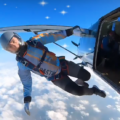- Swallow Group Dropzones:
- Skydive Hibaldstow
- Skydive Spain
- Skydive Algarve
Top AFF Tips
Monday, January 22, 2024
Are you planning to learn to skydive this year? Well, our skydiving centre near to Leeds, Hull & York is the place to go. We have some of the most experienced instructors in the UK who are qualified to teach you for your 1st skydive onwards. Our Accelerated Freefall courses are the route to getting your A-Licence and there’s a lot to learn, all of which is a lot of fun and adrenaline-filled.
Preparing for your first skydive is reasonably straight forward, but there are a few things you can do to make your course easier.
- Indoor Skydiving. Once you’ve signed up, take a visit to a local Indoor Skydiving Tunnel and do 15 minutes flying. You have two options – fly with a recognised tunnel coach who is preferably an Accelerated Freefall Instructor, or use an IBA Tunnel Instructor employed by the tunnel (who may not necessarily be an Accelerated Freefall instructor). Tell them beforehand, that you are planning to do your AFF Level 1 course and they will help prepare you with the absolute basics – i.e. the freefall body position and reading hand signals. 15 minutes in the tunnel should be enough time and is equivalent to 15 skydives.
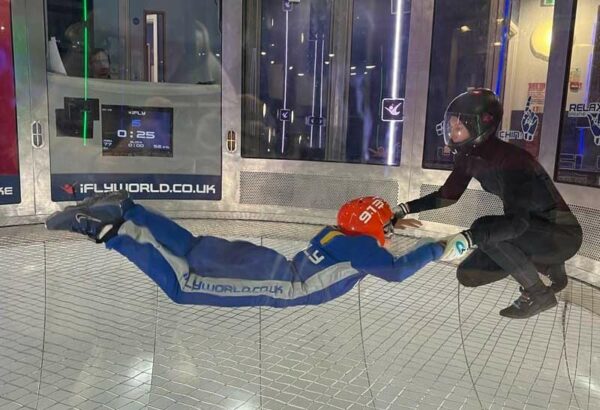
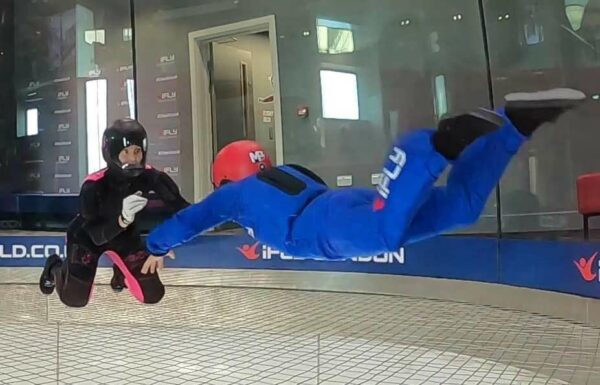
- Make sure each skill is learned before the next one (e.g. holding a heading is learned before doing turns or going up / down). There’s UK wind tunnels located in London, Basingstoke, Milton Keynes, Birmingham and Manchester. The two pics above were taken from Fleur Jones who offers tunnel training in London / Basingstoke. There’s also Catherine Leather who coaches at Manchester and is also highly recommended.
- Watch some AFF videos of other students as they make their first jumps (but don’t watch any video nasties). It’s a great way to help visual what is expected of you and how much fun each jump is. Here’s a few examples of good students to watch:
- Full 7 levels course – https://www.youtube.com/watch?v=KaakCARqKRo
- Level 1 15000ft only course – https://www.youtube.com/watch?v=Ge4VK6dfNDs
- Qualifying 15000ft level 7 – https://www.youtube.com/watch?v=VS-ioQcFvuI
- Qualifying level 8 “hop and pop” exit from 5000ft – https://www.youtube.com/watch?v=BDHGEdM5oZw
- Don’t get drunk. Over the many years we’ve been running our courses, the occasional customer will arrive at the dropzone severely hungover after consuming far too much alcohol from the evening before. The first day of our course is intensive with lots of classroom and practical exercises, all designed to prepare you for that leap of faith! There’s also a small written test. Our instructors need to know that you are ready and understand what is going to happen during your jump. Alcohol doesn’t help here.
- Be prepared to ask lots of questions during your ground training. There’s no such thing as a silly question in our sport. Making assumptions or simply not knowing doesn’t help anyone. We want all our students to pass first time! All our instructors / regular skydivers had to start somewhere and the first skydive will be a real eye-opener and we hope one of the best experiences of your life. Your questions can be over anything you feel pertinent from technical questions, what-if scenarios, something not feeling right, a parachute navigation concept which doesn’t make sense, or anything else.
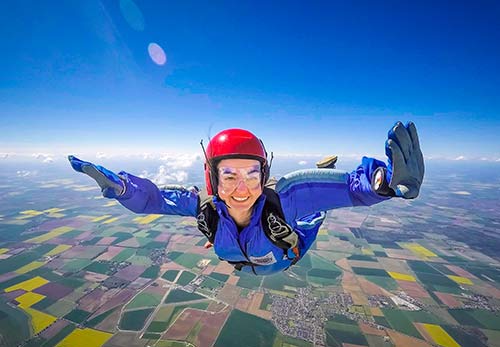
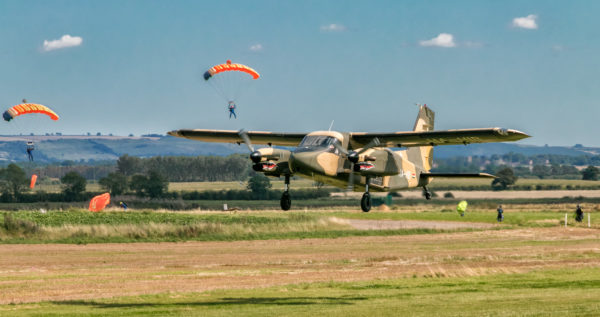
- Pack plenty of clothes, especially thin layers. Our dropzone is located in the middle of farmland, the fields where you land are not always pristine, so you might get a bit muddy on landing. Having some thin layers also allows you to to keep warm without restricting your basic body position and movement in freefall.
- Stretching. In the weeks leading up to your course, do lots stretching in your back and shoulders. This is where the basic body position comes from and allows you to have freefall control / stability. A good arch makes such a big difference and is a fundamental part of freefall.
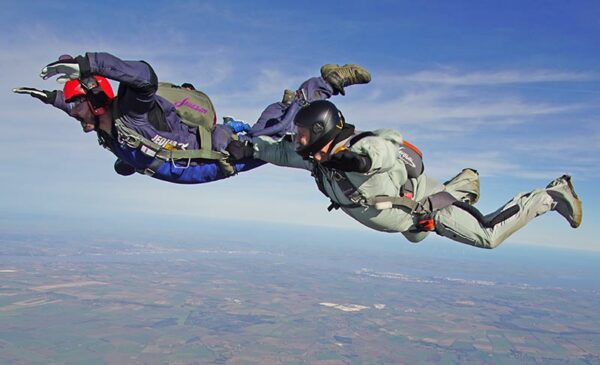
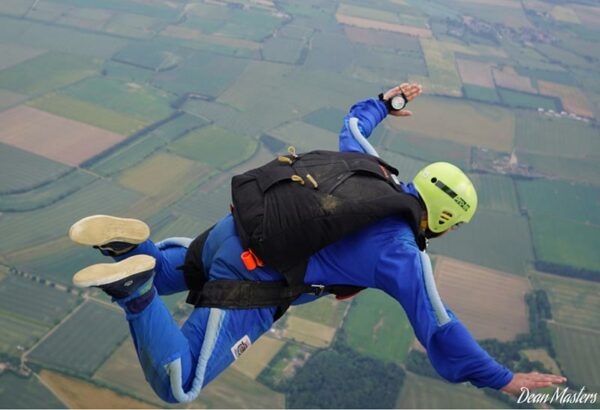
Take a look above, here’s an example of a student showing a good arch (red helmet) versus a bad one (green helmet). In fact the student in blue on the right can be said to be de-arched which can cause them to become unstable and roll on their back. - Expect to have a bit of fear. There’s a lot of psychology in the world of skydiving and that applies to you whether you’re a student with 0 jumps or an instructor with 5000. A bit of fear before your first skydive can actually be useful as a way to focus your mind and pay attention to your instructors. Fear is natural and to be expected, so embrace it and harness it as a tool towards giving a good freefall performance. That might not make a lot of sense right now, but the training your instructors provide gives you the right balance of confidence over fear. So expect one of the most memorable, intense and amazing experiences of your life.
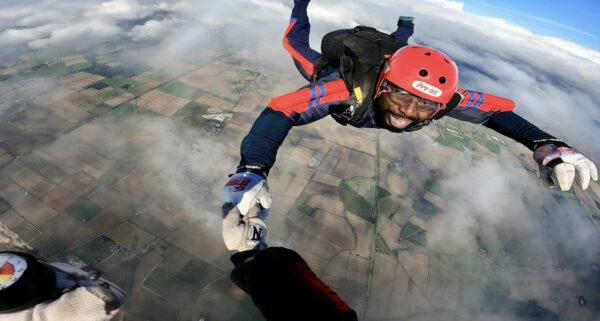
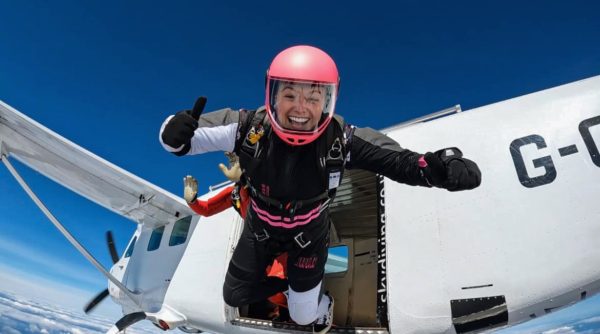
Many thanks to Fleur Jones, Sally Uren and Cath Leather who supported this blog article.
We are so social...
Follow Us!
Stay connected with us! Sign up to receive news and valuable promotions from Skydive Hibaldstow! We won’t spam you (we promise).
Copyright © 2024, Skydive Hibaldstow, All Rights Reserved.
DropZone Web Design & Marketing by Beyond Marketing, LLC
